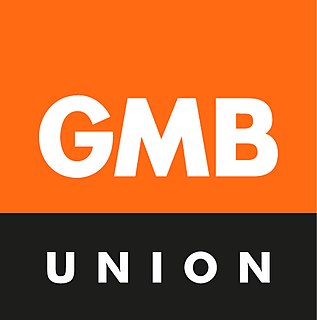Related Research Articles

The GMB is a general trade union in the United Kingdom which has more than 460,000 members. Its members work in nearly all industrial sectors, in retail, security, schools, distribution, the utilities, social care, the National Health Service (NHS), ambulance service and local government.

The Transport and General Workers' Union was one of the largest general trade unions in the United Kingdom and Ireland – where it was known as the Amalgamated Transport and General Workers' Union (ATGWU) to differentiate itself from the Irish Transport and General Workers' Union – with 900,000 members. It was founded in 1922 and Ernest Bevin served as its first general secretary.

The Broadcasting, Entertainment, Communications and Theatre Union (BECTU), formerly the Broadcasting, Entertainment, Cinematograph and Theatre Union, became a sector of the Prospect trade union in the United Kingdom on 1 January 2017 following the merger of BECTU with Prospect. It has approximately 40,000 members who work in broadcasting, film, theatre, IT, telecoms, entertainment, leisure and interactive media.
The National and Local Government Officers' Association was a British trade union representing mostly local government "white collar" workers. It was formed in 1905 as the National Association of Local Government Officers, and changed its full name in 1952 while retaining its widely used acronym, NALGO. By the late 1970s it was the largest British white collar trade union, with over 700,000 members. It was one of three unions which combined to form UNISON in 1993.

The Association of Professional, Executive, Clerical and Computer Staff (APEX) was a British trade union which represented clerical and administrative employees.

The Modern Records Centre (MRC) is the specialist archive service of the University of Warwick in Coventry, England, located adjacent to the Central Campus Library. It was established in October 1973 and holds the world's largest archive collection on British industrial relations, as well as archives relating to many other aspects of British social, political and economic history.

The General Federation of Trade Unions (GFTU) is a national trade union centre in the United Kingdom. It has 35 affiliates with a membership of just over 214,000 and describes itself as the "federation for specialist unions".

The Electrical, Electronic, Telecommunications and Plumbing Union, known as the EETPU, was a British trade union formed in 1968 as a union for electricians and plumbers, which went through three mergers from 1992 to now be part of Unite the Union.
David Anthony Hearn, known as Tony Hearn, is a former British trade union leader.

The Association of Cinematograph, Television and Allied Technicians (ACTT) was a trade union in the United Kingdom which existed between 1933 and 1991.
The Broadcasting and Entertainment Trades Alliance (BETA) was a short-lived British entertainment trade union. It was founded in 1984 with the merger of the Association of Broadcasting Staff and the National Association of Theatrical Television and Kine Employees.
The National Association of Theatrical Television and Kine Employees (NATTKE) was a trade union in the United Kingdom which existed between 1890 and 1984. It represented employees who worked in theatres, cinemas and television.

The Civil and Public Services Association (CPSA) was a trade union in the United Kingdom, representing civil servants.

The Amalgamated Society of Boilermakers, Shipwrights, Blacksmiths and Structural Workers (ASB) was a trade union in the United Kingdom. Many of its members worked in shipbuilding, in which industry it was the leading trade union, while over time it also developed strength in engineering and construction.
The Sign and Display Trades Union (SDTU) was a British trade union that existed between 1917 and 1972.
Sir Joseph Hallsworth was a British trade union leader.

The Trades Union Congress (TUC) is a national trade union centre, a federation of trade unions in England and Wales, representing the majority of trade unions. There are 48 affiliated unions, with a total of about 5.5 million members. The current General Secretary is Frances O'Grady.
The General Council of the Trades Union Congress is an elected body which is responsible for carrying out the policies agreed at the annual British Trade Union Congresses (TUC).
Thomas Leslie Littlewood was a British trade union leader and political activist.
The GCHQ trade union ban was a ban on trade union membership of employees at the Government Communications Headquarters in Cheltenham between 1984 and 1997. This was based on the claim by the Conservative government that it undermined national security. It sparked a dispute which became a cause célèbre, one of the most important trade union issues of the 1980s and the second longest continuously fought dispute in British trade union history.
References
- ↑ Asa Briggs, The History of Broadcasting in the United Kingdom: Volume IV: Sound and Vision, pp.124-125
- ↑ Marsh, Arthur (1984). Trade Union Handbook (3 ed.). Aldershot: Gower. pp. 151–152. ISBN 0566024268.